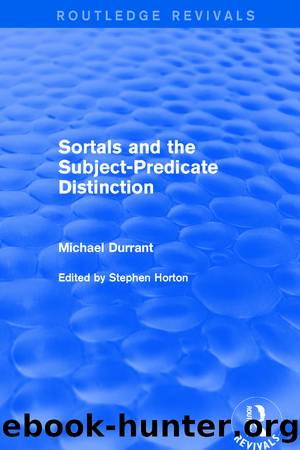Sortals and the Subject-predicate Distinction (2001) by Michael Durrant Stephen Horton

Author:Michael Durrant, Stephen Horton [Michael Durrant, Stephen Horton]
Language: eng
Format: epub
ISBN: 9780367249366
Barnesnoble:
Publisher: Taylor & Francis
Published: 2021-03-31T00:00:00+00:00
C. Some Elucidations and Expansions
Having thus set out what I claim to be the general consequences of failure to recognise the category of the sortal, and also the consequences of failure to recognise principles of counting and distinction formed from âmatterâ terms equally as such principles in their own right, treating both as predicates, it is now time to elucidate and expand on: (i) what I have claimed is an impossible or no account of what constitutes an instance of a sortal; (ii) what I have claimed is an unintelligible account. Equally with regard to what constitutes an instance of a âmatterâ term. I shall, in fact, not explicitly engage in the latter task but shall concentrate on the âsortalâ case as this is my principal interest; it will be clear to the reader what parallel arguments may be adduced in the latter type of case.
C.1. In that someone holds: (1) every particular name, singular symbol, is necessarily a name relating to a sortal (as in A.1. (1) above); or (2) every particular is necessarily a particular of a certain sort (as in A.2. (11) above), then he is committed to holding that what instances a sortal is a name specified by reference to that sortal itself; or again that what instances a sortal universal is a particular specified by reference to that sortal universal itself. Let me consider the âmetaphysicalâ formulation since the point I wish to make is easier to illustrate in this mode. What will instance the sortal universal cat is the particular cat; what will instance the sortal universal man is the particular man. Sortal universals are necessarily required to specify what instantiates them or may instantiate them. But just this is impossible. No universal may of necessity be required to specify its own instances since it is contingent what instantiates any universal i.e. what instantiates a universal is contingently an instance of that universal. The thesis that a universal, of necessity, is required to specify what may instance it yields the paradoxical result that all propositions expressing what Strawson calls the âinstancingâ relation would be necessarily true. To refer to the earlier examples. What can instantiate the sortal universal cat is a particular cat - say Jemima. Since a particular cat is necessarily a cat, âJemima is a catâ becomes a necessarily true proposition. It is in that the thesis that what instances a sortal has a necessary reference to the sortal itself entails the above paradoxical result that I claim this thesis is impossible.
It may be counter claimed here that in that a sortal universal of necessity is used to specify its own instances the above paradoxical result follows, but that all one need hold is that the sortal universal is only mentioned in the specification of its own instances, in answering the question: âWhat constitutes an instance of a sortal?â. But in that case no specification of what constitutes an instance of a sortal is supplied; no answer to the question is provided.
Download
This site does not store any files on its server. We only index and link to content provided by other sites. Please contact the content providers to delete copyright contents if any and email us, we'll remove relevant links or contents immediately.
The European Opportunity by Felipe Fernández-Armesto(569)
The European History Highway: A Guide to Internet Resources by Dennis A. Trinkle Scott A. Merriman(535)
Morgan Kaufmann Digital Watermarking and Steganography by Ingemar Cox Matthew Miller Jeffrey Bloom Jessica Fridrich Ton(528)
The Seven Wonders of the Ancient World by Michael Denis Higgins(521)
Hyperculture by Byung-Chul Han(510)
European Security without the Soviet Union by Stuart Croft Phil Williams(506)
European Security in a Global Context by Thierry Tardy(505)
The Routledge companion to Christian ethics by D. Stephen Long Rebekah L. Miles(498)
Get Real with Storytime by Julie Dietzel-Glair & Marianne Crandall Follis(443)
Hudud Al-'Alam 'The Regions of the World' - a Persian Geography 372 A.H. (982 AD) by V. V. Minorsky & C. E. Bosworth(437)
Gorbachev And His Generals by William C. Green(429)
Tibetan Studies in Comparative Perspective by Chih-yu Shih Yu-Wen Chen(428)
Governance, Growth and Global Leadership by Espen Moe(419)
How Languages Are Learned 5th Edition by Patsy M Lightbown;Nina Spada; & Nina Spada(407)
CliffsNotes on Fitzgerald's The Great Gatsby by Kate Maurer(400)
The Oxford History of the World by Fernández-Armesto Felipe;(388)
The Egyptian Economy, 1952-2000 by Khalid Ikram(379)
Oral Poetry and Narratives from Central Arabia: The Poetry of Ad-Dindan : A Bedouin Bard in Southern Najd (Studies in Arabic Literature, Vol 17) (English and Arabic Edition) by P. M. Kupershoek P. Marcel Kurpershoek(365)
The Oxford Handbook of the Incas by Sonia Alconini(365)
